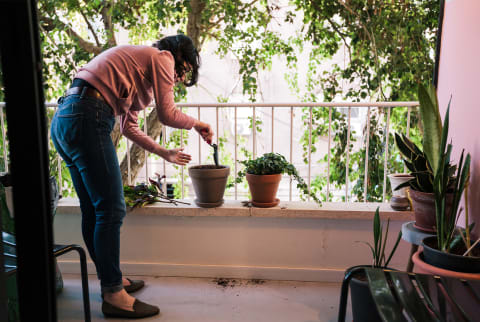
Our editors have independently chosen the products listed on this page. If you purchase something mentioned in this article, we may earn a small commission.
September 10, 2021 — 9:04 AM
At age 22, New York Times bestselling author Danielle Walker was diagnosed with an extreme case of ulcerative colitis. After suffering with the autoimmune disease for a few years, with multiple hospitalizations, she finally identified the dietary and lifestyle changes that helped her balance her health.
It wasn’t as simple as it sounds: The journey came with a handful of triumphs and setbacks, but she has certainly learned a lot along the way, gathering her experiences and tips into her latest must-read, Food Saved Me (and to this day, she’s continuing to learn what works for her by listening to her body).
Of course, every autoimmune disease is different, and not everybody reacts the same way to certain treatments or lifestyle shifts. “It’s about people putting together the puzzle pieces to figure out what works well for them,” she says on this episode of the mindbodygreen podcast. But if you’re curious, Walker shares her general advice for those living with an autoimmune disease—and what she wished she’d known when she was first diagnosed:
1. List foods you can have, versus “no lists.”
For those suffering from an autoimmune disease, food can be a main trigger for people. It certainly is for Walker, who follows a gluten-, dairy-, and legume-free diet. However, sometimes strict protocols can feel, well, restrictive—which can understandably make you feel frustrated and stressed.
“The best thing for you to do is to try to focus on all the things you can have,” Walker says. When she was figuring out what diet works for her, she became overwhelmed by all the foods she was unable to enjoy. “I started to look at food as the enemy,” she continues. “I realized within a few years that was not going to be sustainable for me and that I needed to make [my diet] sustainable so that I could be well and feel well.”
As a result, she changed her mindset: She listed all of the things she could enjoy rather than the foods she could no longer have. “When [I] looked at the list, it actually looked long,” she notes. Then she was able to get creative with her fridge staples and mimic the yummy recipes she used to love growing up—that way, she could still indulge in those memories associated with comfort food. Sure, they may taste a little different, but the intent is still there.
2. Know that food isn’t the only trigger.
“For a decade, I thought food was the only thing [to focus on],” Walker says. Save for a couple of supplements here and there, she thought, “If I just eat this way, then everything’s going to be fine.”
As those living with an autoimmune disease likely know, food is not the only trigger for flare-ups. Things like stress, sleep, and social environment all play a role. “I realized that if I didn’t get enough sleep, if I drove myself into the ground, working too hard, and didn’t talk to people like my husband…there’s a lot we have to make sure that we’re paying attention to,” she explains. “My biggest advice is to breathe and take a look at all of the different things that are happening in your body and your life and figure out how you can try to manage all of those things.”
For Walker specifically, managing sleep and stress are paramount. She has noticed that when she’s stressed or worried, her body creates an inflammatory response. Same goes for sleep: “As an autoimmune disease sufferer, the less sleep I got, the worse my day would be with my symptoms,” she notes. That said, she now prioritizes quality sleep and carving moments for downtime just as much as she prioritizes eating well.
3. Share your story, and talk to others who are also struggling.
Of course, you can read or listen to plenty of scientific research about living with an autoimmune disease—what to eat, how to exercise, who to talk to, etc. The medical field is taking such strides to provide people with helpful information and interventions, which is something to celebrate. However, “For somebody who’s actually suffering with an autoimmune disease or with chronic illness, a lot of times those things can be really overwhelming,” Walker says.
Sometimes, what really helps is to listen to real people sharing their stories, their journeys. “It’s an invisible disease,” Walker continues. “A lot of times you can look at somebody and think that they’re perfectly fine, but they can be really suffering. So I think just encouraging people to share their stories is the biggest thing that’s missing.” For those suffering, hearing others’ stories (and sharing your own) can help you know that you’re not alone.
No autoimmune disease is one-size-fits-all—so while Walker’s tips have personally helped her throughout her journey, think of them not as hard guidelines to follow but tips to employ only if you’d like. And at the end of the day? “My biggest advice is that you are going to be OK,” she says. “You will still be able to smile. You’ll still be able to have the life that you want. It [just] might look a little different.”
https://www.mindbodygreen.com/articles/tips-for-anyone-diagnosed-with-autoimmune-disease








